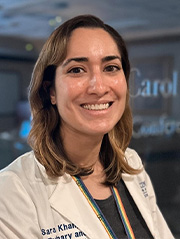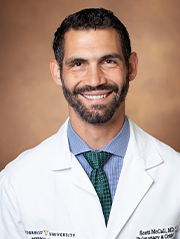Congratulations to the PFF Scholar award recipients!
-

Kristin Berger, MD
Weill Cornell Medical College
Proposal Title: Associations of CT-Assessed Airway Diameter and Clinical Outcomes in Pulmonary Fibrosis
This proposal is funded by Funded by Boehringer Ingelheim Pharmaceuticals, Inc.
Dr. Kristin Berger is an Instructor in the Division of Pulmonary and Critical Care Medicine at Weill Cornell Medical College. She completed her undergraduate studies in Biology through the Honors Program at Susquehanna University, where she also pole vaulted as a member of the track and field team. She then received her MD at the Penn State College of Medicine. She underwent internal medicine residency training at the University of Pittsburgh Medical Center followed by fellowship training at NewYork-Presbyterian/Weill Cornell, where she also received her master’s degree in clinical and translational investigation supported by the NHLBI T32. She has clinical interests in outpatient management of interstitial lung disease patients and critical care medicine. Dr. Berger’s research interest involves early identification and prognostication of interstitial lung disease, and she is currently investigating radiographic biomarkers of disease.
-

Sarah L. Khan, MD, MHS
Johns Hopkins University School of Medicine
Proposal Title: Pulmonary Hypertension Prediction in Patients with Interstitial Lung Disease
This proposal is funded by Funded by the Hastings Foundation
Dr. Sarah Khan is a Pulmonary and Critical Care fellow at the Johns Hopkins University School of Medicine. She completed her medical degree at Drexel University in Philadelphia followed by internal medicine residency and chief residency at Boston University Medical Center. During her fellowship, she has conducted research on radiographic phenotypes of interstitial lung disease-associated pulmonary hypertension and obtained a master’s in health science and clinical investigation from the Bloomberg School of Public Health. For her current proposal, Dr. Khan will use changes in radiographic and physiologic parameters over time to predict which patients with interstitial lung disease are at the highest risk of developing pulmonary hypertension. Her overarching goal is to generate evidence to inform standards of care for diagnosing and managing pulmonary hypertension related to interstitial lung disease and ultimately improve outcomes for affected patients.
One-quarter to half of all patients with interstitial lung disease (ILD) have comorbid pulmonary hypertension (PH). Patients with ILD and PH (PH-ILD) have worse symptoms, more functional limitations, and poorer survival compared to those without PH. Despite the high prevalence and serious implications of PH, there are currently no guidelines to recommend when, how often, and with which tests ILD patients should be screened. Current screening practices for PH-ILD vary widely among ILD providers, so there is a dire need for clinical guidelines. We propose that we may be able to combine two clinical measures which were found to be predictors of PH in patients with scleroderma to identify which ILD patients at risk for PH and should, therefore, be targeted for screening. The first of these potential predictors is based on changes in pulmonary function testing (PFT). The second potential predictor is the extent of lung involvement seen on chest computed tomography (CT). We hypothesize that ILD patients’ risk for PH can be predicted based on their chest CTs and changes in their PFTs over time.
-

Xue Liu, PhD
Cedars Sinai
Proposal Title: Regulation of HER2 Activation in Fibroblast Invasion and Pulmonary Fibrosis
This proposal is funded by Funded by the Hastings Foundation
Dr. Liu’s research focuses on the cellular and molecular changes involved in the pathogenesis of Idiopathic Pulmonary Fibrosis (IPF). Utilizing cutting-edge approaches such as single cell multiomics analyses and rodent animal models, his work aims to investigate the mechanisms driving the invasive fibroblast phenotype in pulmonary fibrosis and to explore the dysregulated genetic programs and niches of alveolar progenitor cells in aging and IPF.
-

Scott M. Matson, MD
University of Kansas
Proposal Title: Metabolomics of preclinical pulmonary fibrosis
This proposal is funded by Funded by the Johanneson Family
Scott M. Matson, MD is an Assistant Professor of Medicine in the division of Pulmonary, Critical Care and Sleep at the University of Kansas. He sees patients in the Interstitial Lung Disease and Rare Lung Disease clinic at KU and attends in the medical intensive care unit while serving as Associate Program Director for the fellowship where he directs the fellowship research program. He is a clinician-scientist focused on translational research in interstitial lung diseases using multi-omics techniques to identify risk factors and biomarkers for ILD development, progression, and treatment prediction.
-

Abraham (Scott) McCall, MD, PhD
Vanderbilt University Medical Center
Proposal Title: HIF2 modulation of alveolar repair in pulmonary fibrosis
This proposal is funded by Funded by Boehringer Ingelheim Pharmaceuticals, Inc.
Dr. A. Scott McCall is an Instructor in the Division of Allergy, Pulmonary and Critical Care Medicine at Vanderbilt University Medical Center. He completed his undergraduate work at Kansas State University then attended Vanderbilt University School of Medicine for his MD and PhD in Pharmacology. He was clinically trained in Internal Medicine then a Pulmonary and Critical Care Fellowship at Vanderbilt University Medical Center where he has joined faculty as a physician-scientist. Much of his research has been driven by IPF transcriptional data and patient-derived organoids to understand the injury repair process and stem-cell function in the lung. By modifying the underlying injury-repair processes, his goal is to bring patient-tailored therapies to the bedside by developing new and innovative therapeutic solutions and repurposing existing compounds to treat fibrotic lung disease.
-

Jeffrey Sturek, MD, PhD
University of Virginia
Proposal Title: The Role of B-1 Cells and IgM in Pulmonary Fibrosis Pathogenesis
Funded by the Buckeye Foundation, the Chuck and Monica McQuaid Family Foundation, and the Jenny H. Krauss and Otto F. Krauss Charitable Foundation Trust, in memory of Stephen N. Dirks
I am a physician-scientist with a research program focused on translational pulmonary immunology. I grew up in Columbia, Missouri and attended undergraduate school at Augustana College in Rock Island, Illinois. I pursued my M.D. and Ph.D. degrees through the Medical Scientist Training Program at the University of Virginia (UVA). I followed this with residency and chief residency in Internal Medicine, and fellowship in Pulmonary and Critical Care Medicine, all at UVA. During the research phase of my fellowship, I gained experience in B cell immunology and translational research methods. In 2019 I came on faculty and was selected as an invited scholar in the Integrated Translational Health Research Institute of Virginia (iTHRIV) Scholars Program, a two-year career development program focused on early career translational health researchers. My clinical focus is on immune-mediated and scaring lung diseases, including interstitial lung disease. My research spans the range of the translational spectrum from clinical to basic laboratory work to understand lung injury and repair. As a dual-trained physician scientist, I feel it is my calling to work at this interface. Outside of the hospital I enjoy staying physically active and spending time with my wife and three children.
